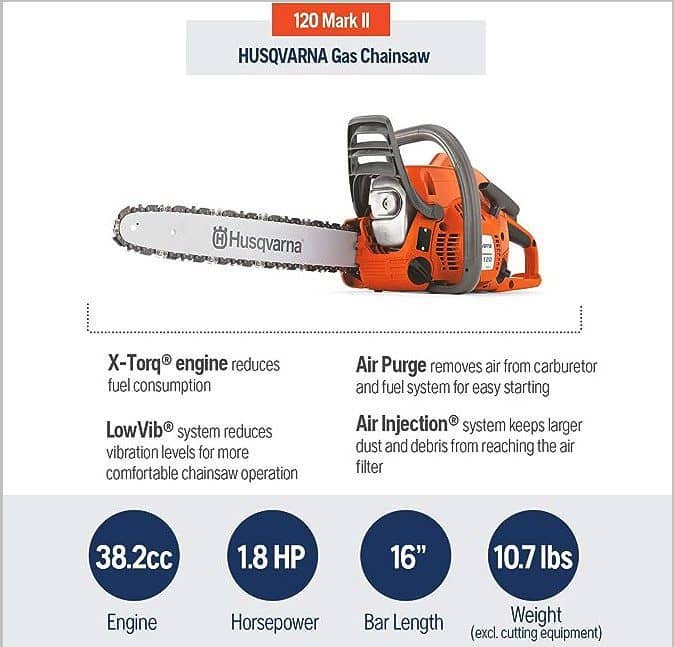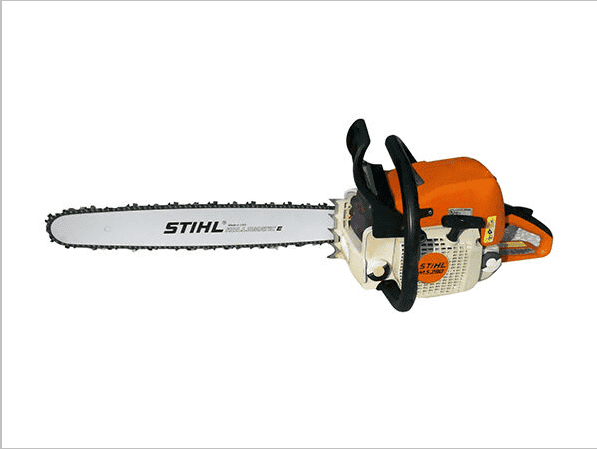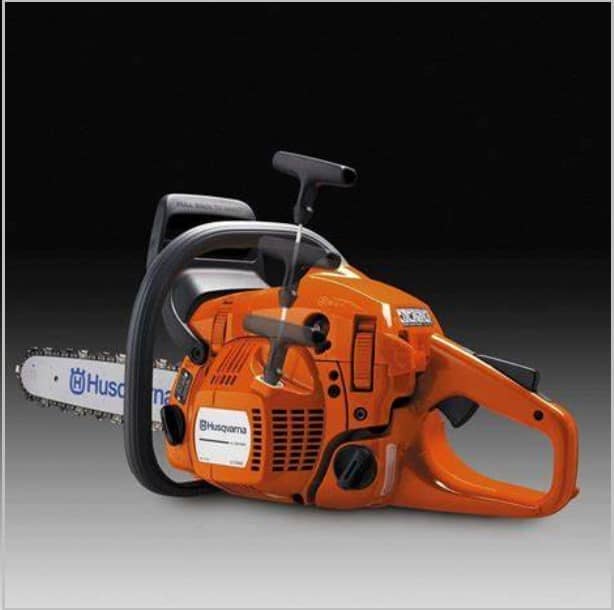
When it comes to choosing a chainsaw, the decision between gas and electric models can be a difficult one. Both types have their own advantages and disadvantages, so it’s important to weigh the pros and cons carefully before making a purchase.
Gas chainsaws are typically more powerful than electric models, making them ideal for heavy-duty tasks such as felling trees and cutting firewood. They also have a longer runtime than electric chainsaws, so you can work for longer periods of time without having to stop and recharge the battery. However, gas chainsaws are also heavier and more difficult to maneuver than electric models, and they produce emissions that can be harmful to the environment.
Electric chainsaws, on the other hand, are lighter and easier to handle than gas models, making them a good choice for smaller tasks such as pruning branches and cutting up firewood. They also produce zero emissions, so they are more environmentally friendly than gas chainsaws. However, electric chainsaws have a shorter runtime than gas models, and they are not as powerful, so they may not be suitable for heavy-duty tasks.
Ultimately, the best way to decide which type of chainsaw is right for you is to consider your individual needs and preferences. If you need a powerful chainsaw for heavy-duty tasks, a gas model is a good choice. If you need a lightweight and easy-to-handle chainsaw for smaller tasks, an electric model is a good choice.
Here is a table that summarizes the key differences between gas and electric chainsaws:
| Feature | Gas Chainsaw | Electric Chainsaw |
|---|---|---|
| Power | More powerful | Less powerful |
| Runtime | Longer runtime | Shorter runtime |
| Weight | Heavier | Lighter |
| Maneuverability | More difficult to maneuver | Easier to maneuver |
| Emissions | Produces emissions | Produces zero emissions |
If you are still unsure which type of chainsaw is right for you, it is a good idea to consult with a professional at your local hardware store. They can help you assess your needs and make the best decision for your individual situation.
Ryobi 14 Gas Chainsaw: Features and Benefits
Ryobi 14 gas chainsaw: Features and Benefits
The Ryobi 14 gas chainsaw is a powerful and versatile tool designed for a wide range of cutting tasks. Its robust construction and advanced features make it an ideal choice for homeowners, landscapers, and professionals alike.
Powerful Engine
At the heart of the Ryobi 14 gas chainsaw lies a 14-inch, 2-cycle engine that delivers exceptional power and performance. This engine provides ample torque for cutting through thick branches and logs with ease.
Automatic Oiler
To ensure smooth operation and extend the life of the chainsaw, the Ryobi 14 gas chainsaw features an automatic oiler. This system continuously lubricates the chain and guide bar, reducing friction and wear.
Anti-Vibration System
For increased comfort and reduced fatigue, the chainsaw incorporates an anti-vibration system. This system effectively dampens vibrations, making it easier to handle the chainsaw for extended periods.
Ergonomic Design
The Ryobi 14 gas chainsaw is designed with ergonomics in mind. Its lightweight construction and comfortable grip provide a secure and balanced hold, reducing strain on the user’s hands and arms.
Safety Features
Safety is paramount with the Ryobi 14 gas chainsaw. It includes several safety features, such as a chain brake that stops the chain instantly in the event of a kickback. Additionally, a hand guard protects the user’s hands from debris.
Versatile Cutting
The Ryobi 14 gas chainsaw is suitable for a variety of cutting tasks, including felling trees, trimming branches, and cutting firewood. Its 14-inch bar length provides ample reach for larger cutting jobs.
Easy Maintenance
Maintaining the Ryobi 14 gas chainsaw is straightforward. Its tool-free access to the air filter and spark plug simplifies routine maintenance tasks. Additionally, the automatic oiler eliminates the need for manual lubrication.
Conclusion
The Ryobi 14 gas chainsaw is a well-rounded tool that combines power, versatility, and ease of use. Its robust construction, advanced features, and safety measures make it an excellent choice for homeowners, landscapers, and professionals seeking a reliable and efficient chainsaw.
Gas Ryobi Chainsaw: Safety Tips and Precautions
Operating a gas Ryobi chainsaw requires utmost caution to ensure safety. Before using the tool, it is imperative to familiarize yourself with its features and safety protocols.
Personal Protective Equipment (PPE)
Always wear appropriate PPE when operating a chainsaw. This includes:
- Safety glasses or goggles to protect your eyes from flying debris
- Earplugs or earmuffs to minimize noise exposure
- Gloves to prevent cuts and abrasions
- Sturdy boots with non-slip soles for stability
Pre-Operation Checks
Before starting the chainsaw, perform the following checks:
- Ensure the chain is properly tensioned and lubricated.
- Check the fuel level and fill the tank with fresh gasoline.
- Inspect the chain brake and ensure it is functioning correctly.
- Clear the work area of any obstacles or debris.
Safe Operating Techniques
- Hold the chainsaw firmly with both hands, keeping your thumbs wrapped around the handles.
- Maintain a balanced stance with your feet shoulder-width apart.
- Start the chainsaw on a level surface and keep it away from your body.
- Engage the chain brake before cutting to prevent accidental starts.
- Cut only when the chain is running at full speed.
- Avoid cutting above shoulder height or in awkward positions.
- Be aware of the direction of the chain’s rotation and cut accordingly.
Post-Operation Precautions
- Allow the chainsaw to cool down before refueling or performing maintenance.
- Clean the chainsaw thoroughly after each use to remove debris and prevent corrosion.
- Store the chainsaw in a dry, secure location out of reach of children.
Additional Safety Tips
- Never operate a chainsaw under the influence of alcohol or drugs.
- Be aware of your surroundings and avoid cutting near power lines or other hazards.
- Keep the chainsaw in good working condition by following the manufacturer’s maintenance recommendations.
- If you encounter any problems or have any questions, consult the user manual or contact a qualified technician.
By adhering to these safety tips and precautions, you can minimize the risks associated with operating a gas Ryobi chainsaw and ensure a safe and productive work environment.
Ryobi Gas Chainsaws: Maintenance and Troubleshooting
Ryobi gas chainsaws are renowned for their power and efficiency, making them a popular choice among homeowners and professionals alike. However, like any power tool, proper maintenance and troubleshooting are crucial to ensure optimal performance and longevity.
Maintenance
Regular maintenance is essential to keep your Ryobi gas chainsaw running smoothly. Here are some key maintenance tasks:
- Clean the air filter: A dirty air filter can restrict airflow, leading to engine problems. Clean or replace the air filter regularly, especially after extended use.
- Sharpen the chain: A dull chain will make cutting difficult and inefficient. Sharpen the chain regularly using a chain sharpener or take it to a professional for sharpening.
- Lubricate the chain: The chain requires lubrication to reduce friction and wear. Use a high-quality chain oil and apply it regularly to the chain and guide bar.
- Check the spark plug: A faulty spark plug can prevent the engine from starting or running properly. Inspect the spark plug regularly and replace it if necessary.
- Store the chainsaw properly: When not in use, store the chainsaw in a dry, well-ventilated area. Drain the fuel tank and run the engine until it runs out of fuel to prevent carburetor problems.
Troubleshooting
If your Ryobi gas chainsaw is experiencing problems, here are some common issues and their potential solutions:
- Engine won’t start: Check the fuel level, spark plug, and air filter. Ensure the fuel is fresh and the spark plug is clean and properly gapped.
- Engine runs rough: Clean the carburetor and fuel filter. Adjust the carburetor settings according to the manufacturer’s instructions.
- Chain won’t cut: Sharpen the chain or replace it if necessary. Check the chain tension and adjust it if needed.
- Oil leak: Inspect the oil tank and lines for leaks. Tighten any loose connections or replace damaged components.
- Excessive vibration: Check the chain tension and balance. Ensure the chain is properly installed and the guide bar is not bent.
Safety Precautions
Always follow proper safety precautions when using a Ryobi gas chainsaw:
- Wear appropriate safety gear, including eye protection, earplugs, and gloves.
- Keep the chainsaw away from children and pets.
- Never operate the chainsaw while under the influence of alcohol or drugs.
- Be aware of your surroundings and avoid cutting near obstacles or power lines.
By following these maintenance and troubleshooting tips, you can ensure that your Ryobi gas chainsaw performs optimally and lasts for years to come. Remember to prioritize safety and seek professional assistance if necessary.
Ryobi Chainsaw Gas: Choosing the Right Fuel
When selecting the appropriate fuel for your Ryobi gas chainsaw, it is crucial to consider the specific requirements of your model. Ryobi chainsaws typically operate on a mixture of gasoline and two-stroke engine oil. The recommended fuel-to-oil ratio varies depending on the chainsaw model, so it is essential to consult your owner’s manual for the correct ratio.
Generally, Ryobi gas chainsaws require a fuel mixture of 50:1, which means 50 parts gasoline to 1 part two-stroke engine oil. However, some models may require a different ratio, such as 40:1 or 25:1. Using the incorrect fuel-to-oil ratio can damage your chainsaw, so it is vital to adhere to the manufacturer’s recommendations.
When choosing gasoline for your Ryobi chainsaw, opt for unleaded gasoline with an octane rating of 87 or higher. Higher octane gasoline burns cleaner and reduces engine knocking, which can prolong the life of your chainsaw. Avoid using gasoline with ethanol, as it can damage the fuel system and carburetor.
Two-stroke engine oil is specifically formulated for use in two-stroke engines, such as those found in Ryobi chainsaws. It contains additives that lubricate the engine and prevent wear. Using regular motor oil in your chainsaw can lead to engine damage.
To prepare the fuel mixture, combine the gasoline and two-stroke engine oil in a clean container. Shake the container thoroughly to ensure the mixture is well-blended. Never mix fuel directly in the chainsaw’s fuel tank, as this can lead to improper mixing and engine problems.
Once the fuel mixture is prepared, fill the chainsaw’s fuel tank to the appropriate level. Avoid overfilling the tank, as this can cause fuel to leak out. After filling the tank, tighten the fuel cap securely to prevent fuel spillage.
By using the correct fuel and fuel-to-oil ratio, you can ensure the optimal performance and longevity of your Ryobi gas chainsaw. Always refer to your owner’s manual for specific fuel recommendations and maintenance instructions.
Ryobi Gas Chainsaw: A Comprehensive Guide
Ryobi gas chainsaw: A Comprehensive Guide
Ryobi gas chainsaws are renowned for their power, efficiency, and versatility. Whether you’re a seasoned professional or a homeowner tackling yard work, Ryobi offers a range of gas chainsaws to meet your specific needs.
Types of Ryobi gas chainsaws
Ryobi gas chainsaws come in various sizes and configurations to suit different applications. The Ryobi 14 gas chainsaw, for instance, is a compact and lightweight model ideal for trimming branches and small trees. For larger tasks, the Ryobi 18 gas chainsaw provides increased power and a longer bar length.
Features and Benefits
Ryobi gas chainsaws boast an array of features that enhance their performance and user experience. These include:
- Powerful engines: Ryobi gas chainsaws are equipped with robust engines that deliver ample power for cutting through tough materials.
- Automatic oilers: Automatic oilers lubricate the chain and bar, reducing friction and extending the life of the chainsaw.
- Anti-vibration systems: Anti-vibration systems minimize vibrations, reducing fatigue and improving comfort during extended use.
- Safety features: Ryobi gas chainsaws incorporate safety features such as chain brakes and hand guards to protect users from accidents.
Choosing the Right Ryobi gas chainsaw
When selecting a Ryobi gas chainsaw, consider the following factors:
- Bar length: The bar length determines the maximum cutting capacity of the chainsaw. Choose a bar length that is appropriate for the size of trees and branches you will be cutting.
- Power: The engine power is measured in cubic centimeters (cc). Higher cc engines provide more power for demanding tasks.
- Weight: The weight of the chainsaw affects its maneuverability. Choose a chainsaw that is lightweight enough for comfortable handling.
Maintenance and Safety
Proper maintenance is crucial for the longevity and performance of your Ryobi gas chainsaw. Regularly clean the air filter, spark plug, and chain. Sharpen the chain as needed to ensure optimal cutting efficiency.
Safety should always be a priority when operating a gas chainsaw. Wear appropriate protective gear, including gloves, safety glasses, and earplugs. Follow the manufacturer’s instructions carefully and never operate the chainsaw under the influence of alcohol or drugs.
Conclusion
Ryobi gas chainsaws offer a combination of power, versatility, and user-friendly features. By choosing the right model and following proper maintenance and safety guidelines, you can enjoy years of reliable service from your Ryobi gas chainsaw.
Q&A
1. What is the engine size of the Ryobi 14 gas chainsaw?
42cc
- What is the bar length of the Ryobi 14 gas chainsaw?
14 inches - What is the chain pitch of the Ryobi 14 gas chainsaw?
0.375 inches - What is the chain gauge of the Ryobi 14 gas chainsaw?
0.050 inches - What is the weight of the Ryobi 14 gas chainsaw?
10.8 pounds - What is the warranty on the Ryobi 14 gas chainsaw?
3-year limited warranty









